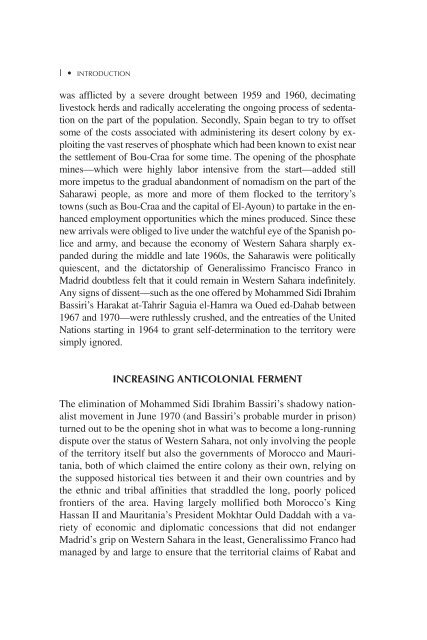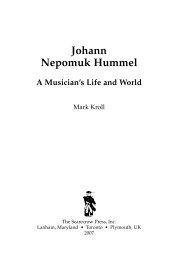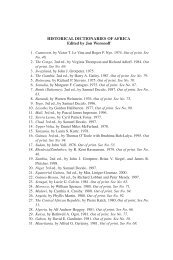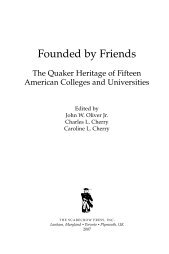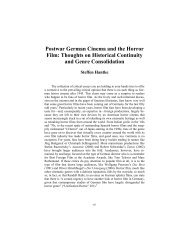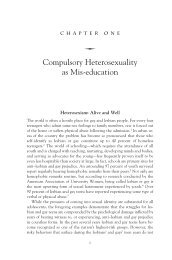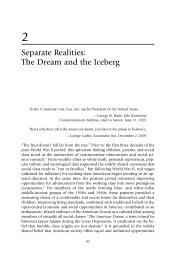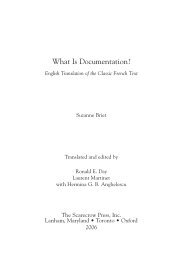Historical Dictionary of Western Sahara Third ... - Scarecrow Press
Historical Dictionary of Western Sahara Third ... - Scarecrow Press
Historical Dictionary of Western Sahara Third ... - Scarecrow Press
Create successful ePaper yourself
Turn your PDF publications into a flip-book with our unique Google optimized e-Paper software.
l • INTRODUCTION<br />
was afflicted by a severe drought between 1959 and 1960, decimating<br />
livestock herds and radically accelerating the ongoing process <strong>of</strong> sedentation<br />
on the part <strong>of</strong> the population. Secondly, Spain began to try to <strong>of</strong>fset<br />
some <strong>of</strong> the costs associated with administering its desert colony by exploiting<br />
the vast reserves <strong>of</strong> phosphate which had been known to exist near<br />
the settlement <strong>of</strong> Bou-Craa for some time. The opening <strong>of</strong> the phosphate<br />
mines—which were highly labor intensive from the start—added still<br />
more impetus to the gradual abandonment <strong>of</strong> nomadism on the part <strong>of</strong> the<br />
<strong>Sahara</strong>wi people, as more and more <strong>of</strong> them flocked to the territory’s<br />
towns (such as Bou-Craa and the capital <strong>of</strong> El-Ayoun) to partake in the enhanced<br />
employment opportunities which the mines produced. Since these<br />
new arrivals were obliged to live under the watchful eye <strong>of</strong> the Spanish police<br />
and army, and because the economy <strong>of</strong> <strong>Western</strong> <strong>Sahara</strong> sharply expanded<br />
during the middle and late 1960s, the <strong>Sahara</strong>wis were politically<br />
quiescent, and the dictatorship <strong>of</strong> Generalissimo Francisco Franco in<br />
Madrid doubtless felt that it could remain in <strong>Western</strong> <strong>Sahara</strong> indefinitely.<br />
Any signs <strong>of</strong> dissent—such as the one <strong>of</strong>fered by Mohammed Sidi Ibrahim<br />
Bassiri’s Harakat at-Tahrir Saguia el-Hamra wa Oued ed-Dahab between<br />
1967 and 1970—were ruthlessly crushed, and the entreaties <strong>of</strong> the United<br />
Nations starting in 1964 to grant self-determination to the territory were<br />
simply ignored.<br />
INCREASING ANTICOLONIAL FERMENT<br />
The elimination <strong>of</strong> Mohammed Sidi Ibrahim Bassiri’s shadowy nationalist<br />
movement in June 1970 (and Bassiri’s probable murder in prison)<br />
turned out to be the opening shot in what was to become a long-running<br />
dispute over the status <strong>of</strong> <strong>Western</strong> <strong>Sahara</strong>, not only involving the people<br />
<strong>of</strong> the territory itself but also the governments <strong>of</strong> Morocco and Mauritania,<br />
both <strong>of</strong> which claimed the entire colony as their own, relying on<br />
the supposed historical ties between it and their own countries and by<br />
the ethnic and tribal affinities that straddled the long, poorly policed<br />
frontiers <strong>of</strong> the area. Having largely mollified both Morocco’s King<br />
Hassan II and Mauritania’s President Mokhtar Ould Daddah with a variety<br />
<strong>of</strong> economic and diplomatic concessions that did not endanger<br />
Madrid’s grip on <strong>Western</strong> <strong>Sahara</strong> in the least, Generalissimo Franco had<br />
managed by and large to ensure that the territorial claims <strong>of</strong> Rabat and


